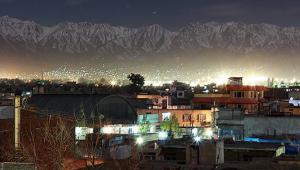The appeal has been launched amid concerns over donor fatigue and a rise in nationalist sentiment in a number of countries around the world. It is feared that inward-looking policies are threatening to cut already-limited aid funds even further.
Last year, the UN’s appeal topped $22.1 – also a record at the time. But the scale of need far outpaced available funds. Although donors provided a record sum of $11.4bn, this was only 52% of what was needed.
This year’s appeal looks set to conclude with a gap of $10.7bn, marking another record broken amid a time of unprecedented natural and man-made crises.
Stephen O’Brien, the UN’s humanitarian chief, explained that the scale of humanitarian need today “is greater than at any time since the UN was founded”.
“Not in living memory have so many people needed our support and solidarity to survive and live in safety and dignity,” he said.
From the ever worsening crisis in Syria and other conflict-driven emergencies in Yemen, Nigeria and South Sudan, to the extreme droughts, floods and storms of the past few years, around the world,128 million people are affected.
The UN’s 2017 response plan targets nearly 93 million vulnerable people mainly across Africa, Asia and the Middle East. It aims to provide necessities like shelter, health care, protection, education, food and water.
“Our collective plans to meet people’s needs are ready,” said O’Brien. “They are effective and efficient investments – the best way to help those who need help now.
“The lives of millions of women, girls, boys and men are in our hands. By responding generously and delivering fully on this appeal we will prove to them that we will not let them down.”
But in a context of ever-rising need, a sluggish global economy and high refugee costs at home across countries in Europe, donors have been unable to keep pace with need despite giving more than ever before.
Many emergencies remain severely underfunded, others largely forgotten. This state of affairs prompted the UN to set up the first-ever World Humanitarian Summit in May this year in a bid to reform the system and find ways to approach the problem.
Now, a rising tide of nationalism that has culminated in the election of incoming US president Donald Trump threatens aid further. Trump’s ‘America first’ outlook casts uncertainty over the country’s aid agency, USAID, which he has yet to even mention, and the country’s aid funding.
The US is currently the biggest overseas aid donor in cash terms, delivering $31.08bn in 2015. However that amounts to just 0.17% of the country’s national income, while some donors commit to more than 1%.
Separately, a group of UN experts also warned last week that governments must honour their political and financial commitments to the Sustainable Development Goals, which will cost an estimated $1tn per year to achieve, or risk derailing the agenda.
The experts, which included the UN’s special rapporteurs on issues spanning human rights, democracy and basic needs like food and education, said one year on from the agreement, progress toward the goals has been “both insufficient and unequal”.
“The test now is whether governments will go beyond rhetoric and act on promises to leave no one behind,” they wrote in a joint statement.
“The SDGs will remain empty promises without proper political and financial commitment, regulation, management and related safeguards.”













